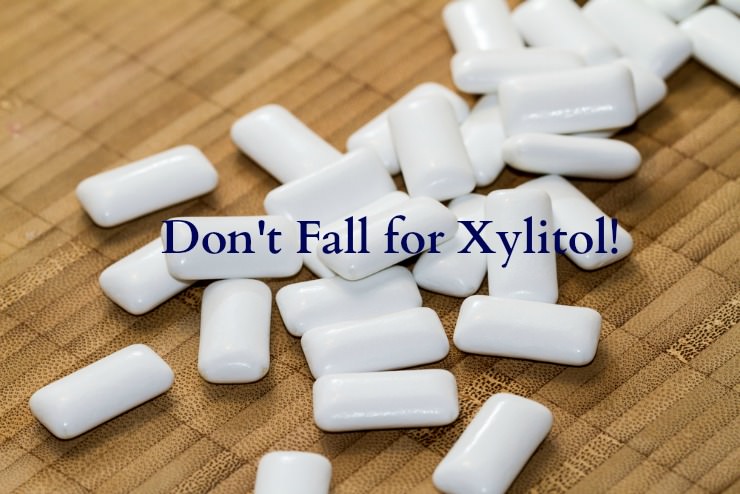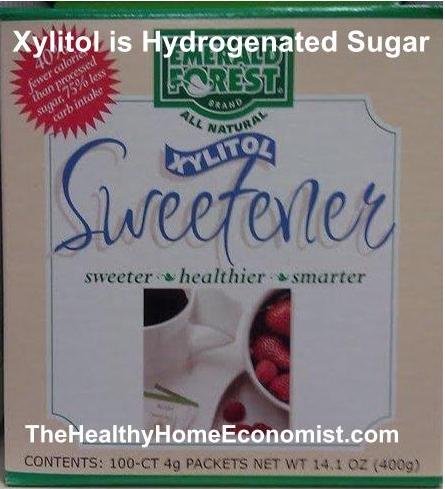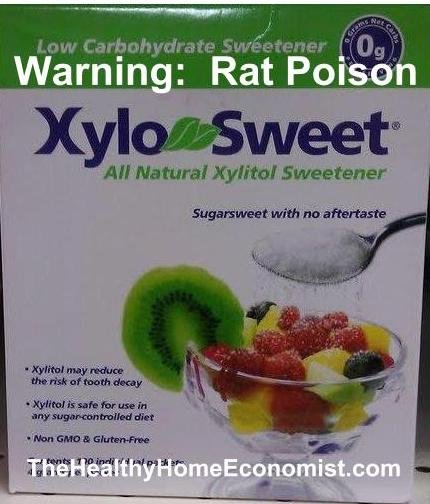
Xylitol is truly the darling of sugar substitutes today. The American Dietetic Association touts its use, with this sugar alcohol sold alone and as a sweetener in a variety of processed foods. Health benefits include a reduced glycemic response compared with sucrose, increased absorption of B vitamins and calcium, and even a reduction in dental caries risk.
Consequently, people with blood sugar issues are flocking to processed foods containing this alternative sweetener as a way to satisfy that sweet tooth without the downside of exacerbating the risk factors for Metabolic Syndrome. This condition is known for the markedly increased likelihood of developing heart disease, stroke, and type 2 diabetes.
Even the healthfood community almost universally considers this sugar alcohol to be a healthy substitute for sugar. A primary reason is that it doesn’t directly contribute toward the growth of intestinal yeasts aka Candida.
Have you noticed that the check out aisles at health food stores are typically loaded with chocolates and other sweets containing at least some xylitol? The truth is that I have yet to talk with any health-conscious person who suggests to me any downside other than the potential for intestinal cramps if you get too much.
Xylitol is Naturally Found in Nature
Xylitol is, after all, a naturally occurring substance. Manufacturers of xylitol market it as derived from xylan. The fibers of many plants contain it, including berries, oats, beets, sugar cane and birch. Sounds pretty harmless at first glance.
The FDA has even granted xylitol GRAS (Generally Recognized As Safe) status. You can’t get any safer than that, right?
 Manufacturing Process
Manufacturing Process
It is true that xylitol is a naturally occurring substance. However, manufactured xylitol is another matter entirely. Food manufacturers produce it using the industrialized process of sugar hydrogenation. In order to hydrogenate anything, a catalyst is needed. In this case, Raney nickel is used which is a powdered nickel-aluminum alloy. (1, 2)
This poses the risk of heavy metal residue and contamination. Nickel, by the way, is a recognized carcinogen and aluminum is associated with the development of dementia. Heavy metals in the body are notoriously difficult to eliminate with frequent use of infrared sauna probably a good idea.
This alternative sweetener doesn’t seem quite so warm and fuzzy anymore, does it?
There is currently no literature on any detrimental health effects of consuming hydrogenated sugar. However, food manufacturers widely used hydrogenated fats for decades before the very damaging effects of cardiovascular health became widely known!
Given the violent industrialized process that is required to produce a hydrogenated sugar like xylitol, it would seem wise to avoid it based on the very poor track record of hydrogenated foods in general.
Most Xylitol Sourced from GMO Corn
While it is true that xylitol can be derived from the xylan of birch trees, xylan is also found in corn cobs. It is much cheaper to use corn instead of birch bark to derive xylitol and so what do you think manufacturers prefer? Corn, of course.
Therefore, unless the label of a xylitol-containing product specifically notes that it is from birch or another nonGMO source, xylitol is very likely from genetically modified corn or possibly GMO sugar beets.
This is the same problem as high fructose corn syrup (HFCS) and white sugar from beets. Food manufacturers rely heavily on these sweeteners in the production of sodas and sports drinks.
You get a dose of GMOs with every sip! More on GMO dangers including sterility and stomach holes at the provided link.
Usage Contributes to Gut Imbalance
The digestive process does not break down sugar alcohols like food. Rather, xylitol arrives intact into the intestines.
At that point, a process called “passive diffusion” takes place. This means that the xylitol draws water into the bowels. Only a partial breakdown is the end result. The unmetabolized portion ferments providing the perfect environment for undesirable bacteria to thrive and grow.
It is true that xylitol itself does not feed candida directly as sugar does. As a result, this artificial sweetener is even promoted as a useful part of the Candida Diet. Unfortunately, the fermentation of undigested xylitol in the gut most definitely can exacerbate yeast problems. Don’t be fooled by this argument!
This is exactly why consuming xylitol can make some folks so gassy and even trigger cramping and diarrhea. Gut pathogens having a heyday in your intestines give off a lot of smelly toxins!
Other Little Known Problems
Xylitol can contribute to acid reflux problems. As a result, those who have issues in this area should avoid it for that reason alone. Chronic acid reflux is a serious problem that can lead to cancer of the esophagus and larynx.
In addition, those who suffer from seizures of any kind should stay away from this alternative sweetener as it can increase the frequency of epileptic attacks.
Two Pieces of Xylitol Gum Can Kill a Rat?
According to unpublished lab tests, approximately 1.65 grams of xylitol kills a 100-gram rat half the time.
Two little pieces of xylitol gum contain about .7 – 1 gram. This is probably enough to meet the definition of rat poison.

Cavity Prevention
Many people are chewing xylitol gum due to compelling scientific evidence for cavity prevention. What about children, however?
Rami Nagel, author of Cure Tooth Decay, doesn’t even recommend xylitol gum for this purpose. His research for any long term safety data turned up the following:
- Epidemiology: No information found
- Teratogenicity: No information found
- Reproductive Effects: No information found
- Mutagenicity: No information found
- Neurotoxicity: No information found
In summary, using this modern substance officially renders you a guinea pig, my friend! It seems that any benefits of cavity prevention are outweighed by the fact that there is no actual safety data backing up its use.
Safe Uses of Xylitol
Given all the problems that consumption of xylitol can trigger, it seems best to bypass the use of this sugar substitute on a regular basis.
Can it ever be helpful? Does it have any benefits whatsoever?
Potentially so. The only time I personally would ever consider using xylitol is to help resolve a childhood ear or sinus infection in order to prevent the use of drug-based antibiotics.
There is evidence that this popular sugar alcohol can indeed help encourage a healthy balance of beneficial bacteria found in the ear canal and sinus cavities. Products like this incorporate xylitol for this purpose.
A therapeutic dose can help resolve infection in these areas quickly with no medication required.
Thus, if you choose to use it, make sure it is sparingly and therapeutically (not as food). Also, make sure it does not come from a GMO source like corn!
References
(1) Xylitol production via catalytic hydrogenation of sugarcane
(2) Catalytic hydrogenation of xylose to xylitol using ruthenium catalyst on NiO modified TiO2 support
(3) Cure Tooth Decay by Rami Nagel
(4) Sugar-Free Blues: Everything You Wanted to Know about Artificial Sweeteners
More Information
Yacon: Healthy Syrup or Healthfood Hype?
Jaggery: India’s Sweet Gift








I’m rather new to the idea of making all-natural personal care products, but just wanted to remind all of you that everyone is different, and what may not affect one person, may affect another extremely adversely. A few years ago, my husband (not into “natural” at all) purchased some chewing gum sweetened with xylitol. I’m not a gum chewer normally, but ended up chewing one stick 2 or 3 days within a 4-5 day period, and shortly after putting that last piece in my mouth, I experienced severe vertigo, with severe nausea and uncontrollable vomiting. Concerned that the xylitol might be the culprit, I abstained for about a month and tried again – with even worse results. Not to be a “negative Nellie”, but beware! I think I’ll try this mouthwash with stevia, and continue with oil pulling.
Hi Sarah, long time reader!
I tend to be in the minority when it comes to my toleration of xylitol. I can often consume a large amount of it without any distress. Erythritol, on the other hand…well, let’s not get into that.
I’m having a challenging time trying to find evidence that xylitol destroys gut bacteria/microflora balance. I love xylitol, but would definitely reconsider if there are any real published studies showing its affect on flora.
Thanks!
P.S. The only study I could find so far is this one: http://www.ncbi.nlm.nih.gov/pubmed/17995737. It states that the fermentation of xylitol increases butyrate and other short-chained fatty acids, and possibly has a positive effect on gut health. This is in vitro, mind.
A scientist from a non-GMO xylitol company sent me the following information:
Hydrogenation occurs in nature and sugar alcohols in berries etc. are also hydrogenated starches. Of course, this is unrelated to hydrogenated oils and their very real dangers, since oils aren’t naturally hydrogenated. Is this an attempt to imply guilt by association?
Xylitol is produced in countries that don’t allow GMO corn for human consumption; therefore the assertion that much is GMO is a wild guess unsupported by real world data.
The fact that pets can’t safely use xylitol is meaningless for people. Some pets can’t eat chocolate either. So what? Assuming that these examples are somehow meaningful for human health without some explanation of how they would be is unscientific. Other foods that are harmful to dogs (ASPCA) include: avocado, bread dough, grapes and raisins, macadamia nuts, onions and garlic. By the same reasoning, people also need to avoid these foods if they need to avoid xylitol because of its toxicity to animals. Really?
The safety data on xylitol is robust and it is generally recognized as safe (GRAS) by health agencies around the world. Certainly, toxicity and cancer studies have been done, regardless of what an author claims to have not found.
If you don’t worry about sugar hydrogenation, that’s your choice. Xylitol is still harmful to eat just by virtue of the fact that it rips gut balance to shreds by feeding pathogens and starving probiotics.
Hi Sarah,
Just wondering where you evidence for xylitol ‘ripping gut balance to shreds by feeding pathogens and starving probiotics’ comes from? I’m really interested in the safety issues surrounding use of polyols both for medicinal use and as occasional sugar/high gi sweetner substitutes, because we have chosen to use them at home and, on balance, love them! Because of this have done a lot of research on the web. There appear to be a lot of published journal articles suggesting that xylitol (and other polyols like isomalt) are in fact pre-biotic and have positive effects of gut microflora. Interested to hear what you have found that suggests otherwise?
Sources at the end of the post 🙂
is that the gmo ones that rip gut s apart or the non gmo ?
Nongmo xylitol is also highly gut imbalancing. People are way too flippant about their gut health these days.
I disagree with you. In moderation xylitol is a good choice. No sugar is good for us, but you obviously have not done your homework on this one. There are many other articles giving the pros and cons, just google it.
Tara Broms Shaw I should have clarified – I’m not a fan of using xylitol as a food, but I agree with Healthy Home Economist that used therapeutically or not as a food it can be ok. I still highly recommend Jack and Jill toothpaste especially since it has a 0 EWG rating. I think it’s a great toothpaste to start kids on!
Does that mean you don’t recommend Jack & Jill toothpaste anymore? I think I decided it’s impossible to find a good toothpaste for kids!
Your point about the hydrogenation of sugars possibly being the dangerous health equivalent of hydrogenation of fatty acids is really reaching. Partial hydrogenation of a long-chain fatty acid causes a double bond somewhere in the center, which can potentially give it a “trans-” (vs “cis-“) formation, causing the fatty acid to be more likely to block small blood vessels. Long-chain fatty acids are many, many carbons (18+), whereas simple sugars are 6 carbons in a ring, not in a chain, and xylitol is a 5-carbon sugar alcohol (which means it has an -OH group on it instead of a hydrogen, not that it’s alcoholic). I understand your concern about anything “artificial” (although it springs to mind that arsenic is plenty natural, but I would rather not consume any), but please remember that the plural of “anecdote” is NOT “data,”
The fact that xylitol contributes to a destroyed and imbalanced gut environment and feeds pathogens in the gut rather than beneficial flora is plenty enough reason for me to avoid it. 🙂
I was all excited about discovering xylitol because for the last two years now iv’e had upper respiratory infections . Now i’m confused . I want to know what a thereputic dose is ?
Peer-reviewed published research has shown the contents of clogged heart arteries during bypass surgery is equivalent to margarine or hydrogenated oils. And the heart cannot heal itself. If Xylitol is dangerous, then it must take large quantities or specific allergies, specific sensitivites. I suffer Gulf War Illness, which means my heart is damaged and my gut is infected with no less than 3 specific chronic infections. I am sensitive to almost everything; and I can eat almost nothing for Lactose Intolerance, systemic fungus (in remission), and pancreatitis from a Hep B “cocktail” vaccine. I never eat hydrogenated oil. But I chew enough cinnamon Xylitol to clear my sinuses and my palette. It’s a substitute for brushing my teeth too many times per day. My gut has never reacted to 2 small bits of gum, as long as I avoid aspartame. And my gut, unlike my heart, can eventually heal from everything.
@Beckie, if you see this – what you really need is to start using Prescript-Assist ~ Probiotic & Prebiotic Blend. If I ever heard of someone who desperately needs it is you. As for Xylatol, a friend with Lyme was told by her NMD to eat 2 tbsp. of it daily to bust biofilm cysts formed by borrelia and co-infections. Both of us are MTHFR mutated, mine works than hers but we both have to watch what we injest. I originally jumped on board with it (also struggling through tick borne illnesses). Still, after two days of just one tbsp. my kidneys feel odd. I might stick with Serrapeptase enzyme for cyst busting and just use Xylatol to sweeten a tea or two.
And extra virgin coconut oil…but if you have not added that to your diet, be aware it has to be added slowly or you can get the trots. It is antimicrobial, antiviral, antifungal and antibacterial. Get the cold pressed, extra virgin, organic type thoug, not the expeller pressed that uses chemicals.
Google Dr. Mary Newport to get some good directions on adding it to your diet. She is not selling the stuff but using it to help (semi-cure) her husband from Alzheimers. She gives some good info on it, such as it can kill herpes, in part by destroying the biofilm surrounding the herpes virus.
What about erythritol? It doesn’t cause the same gastro symptoms…
I would like to know where you received the information that xylitol can trigger seizures in epileptics. I read this about dogs, not humans.
Please remember people dogs can not eat the same foods as us. My dog is a husky and he isn’t supposed to eat certain berries and beets. Summarized up, we are different species with very different intestines.
I have used a birch based xylitol for years. I have never had problems and I have IBS. I can’t eat to much of the xylitol or I do get diarrhea. HOWEVER, I also get diarrhea if I eat to much salad greens. Humans were not designed to survive off sugar so of course I don’t think you should eat the stuff out of its packaging. I do really like it for my tea, coffee, and the occasional baked good. I have never heard some of these arguments so I’m very interested on the studies to back them up.